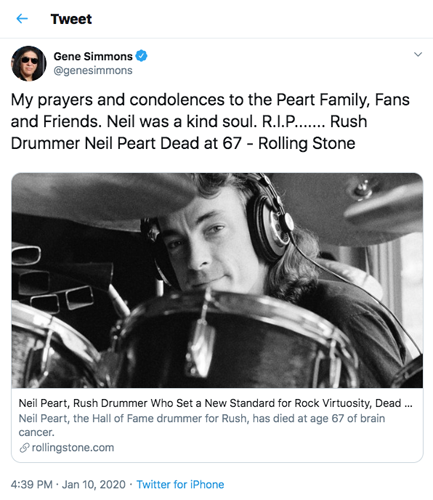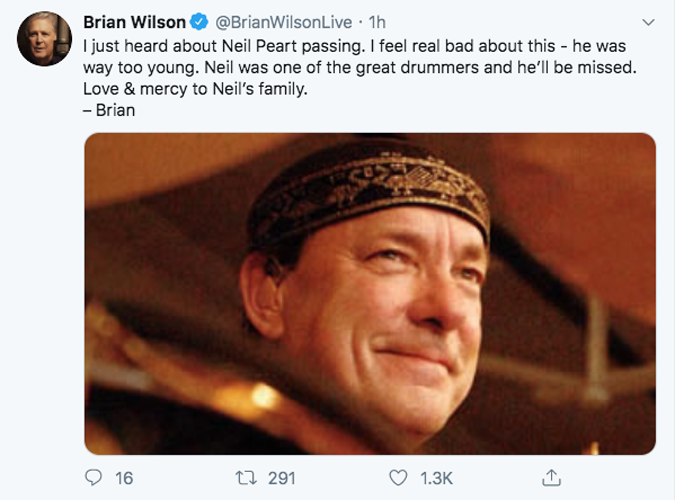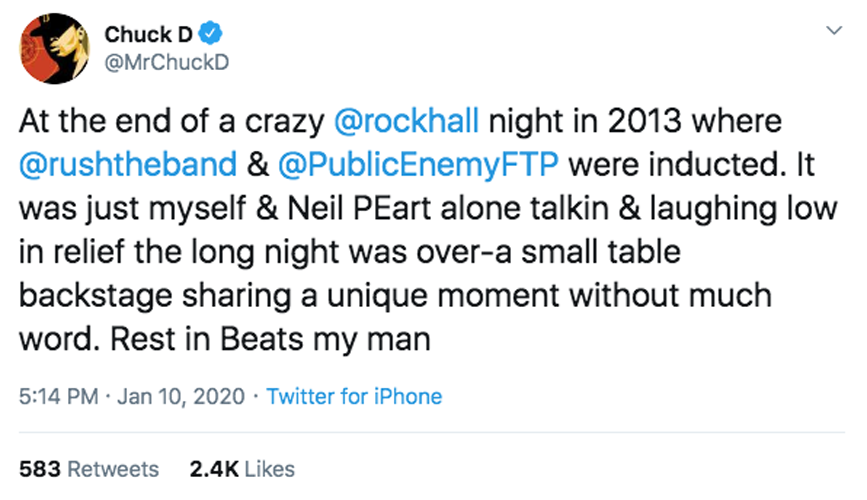Remembering Neil Peart: The Legendary Rush Drummer Dies at Age 67

Neil Peart was among rock and roll's most respected drummers, gaining fandom and praise from multiple generations of musicians. Photo: Clayton Call/Redferns
Like many people my age, I saw Rush play my high school dance. But of course, it wasn’t really Rush yet in that gymnasium in Thunder Bay.
It was the incarnation of the band that existed just before the introverted and introspective, ground-breaking drummer Neil Peart joined in 1974, his notepad of sci-fi and Ayn Rand-inspired lyrics in hand, and his brain carrying a beat that was both powerful and precise. It was unusual for a drummer to double as the band’s lyricist, but Peart fell into that role naturally.
In confirming Peart’s death Friday at age 67, spokesperson Elliot Mintz said he had been “quietly” battling brain cancer for three years. This sounds about right, since Peart was the least interviewed and least outspoken member of Rush, generally leaving the questions to guitarist Alex Lifeson and frontman/bassist Geddy Lee.
Peart was the one who dealt with the tragic deaths of his daughter Selena (in a car accident) and spouse Jackie (cancer) by quitting the band in 1997 and escaping into anonymity, traversing the U.S. on his motorcycle. (He would rejoin Rush in 2001, but would still ride his bike from city to city while on tour, enjoying the highway and the escape from the noise).
Promoting the documentary Time Stand Still — about the band’s final tour in 2015, two years after their induction into the Rock and Roll Hall of Fame — Geddy Lee told me he was always concerned about how Peart was handling the attention.
“I remember looking at Neil in our very first concert of the tour and he was nervous, he was very anxious. So, I knew in my mind, ‘I’ve got to go over there and make him laugh somewhere in the first three songs, so he’s not thinking about the overwhelming fact of being back on stage.’
“Our music was always very player driven and complex, which was why it was kind of an acquired taste. If you wanted a typical rock song, you wouldn’t get it from us. And Neil was a big part of that.”
The Hamilton, Ont.-born, Port Dalhouse-raised Peart had conventional rock influences as a drummer — often citing The Who’s Keith Moon and Led Zeppelin’s John Bonham. But he began absorbing jazz and big band music among other genres, his time signatures morphing to match the complexity of the thoughts he was putting to paper. Lee, who found them a challenge to sing, said the only song lyrics he ever blanked on onstage was their hit “Closer to the Heart”.
Peart’s fondness for Ayn Rand’s novels was put to paper in “2112,” a song with lyrics about an individual struggling against collectivism. Other songs rang with positivity, like The Spirit of Radio, which remains one of the greatest odes to rock ever written.
While Peart’s busy, complex lyrics weren’t universally appreciated, his drumming gained him a devoted fandom from other artists young and old.
Within hours, Gene Simmons and Paul Stanley of Kiss (for whom Rush opened early in their career) mourned his death on Twitter, as did the Beach Boys’ Brian Wilson, Peter Frampton and Chuck D of Public Enemy.



Shortly after that 2015 tour, Peart announced his de facto retirement in an interview in the online magazine Consequence of Sound.
“It does not pain me to realize that, like all athletes, there comes a time to… take yourself out of the game,” he said. “I would rather set it aside then face the predicament described in our song ‘Losing It.’”
That song, of course, contains the lyric ‘Sadder still to watch it die, than never to have known it.’”
RELATED:
10 Music Legends Who Redefined Aging in the 2010s
50 Years Later, Remembering John Lennon and the Toronto Rock and Roll Revival
Watch the First Music Video From Leonard Cohen’s Posthumous Album Thanks for the Dance